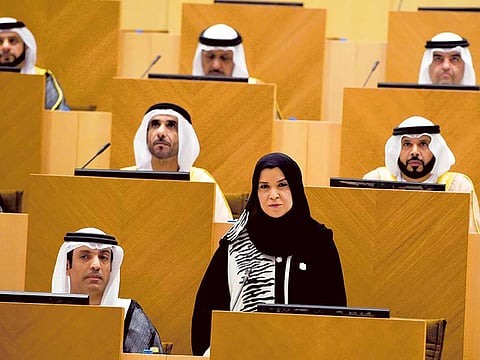FNC Speaker raises profile of Arab women
Dr Amal’s election as FNC Speaker highlights success of women’s empowerment efforts in GCC

Dubai: The election of Dr Amal Al Qubaisi as the first woman Speaker in an Arab country marks a new chapter in the list of trailblazing achievements by Arab women at the national level. An Arab woman chairing a parliamentary session is not unheard of since it has happened before in other countries, mainly in neighbouring Bahrain, but they have taken up such roles on an interim basis at best.
The UAE on Wednesday made history by electing Dr Amal as the first woman Speaker of the Federal National Council (FNC), a position that will see her preside over the FNC’s sessions and elevate her status to rank among the most powerful women in the country and in the Arab world.
The Secretary-General of the Arab League, Nabeel Al Arabi, has congratulated the UAE on the election of Dr Amal as FNC Speaker.
Al Arabi pointed out that the appointment represents great progress for Emirati women in particular and Arab women in general. He called for Arab women to play a key role in policy development in all countries and to ensure their participation in decision-making.
“We are pleased that a woman from the UAE has made the breakthrough that will most certainly have great consequences in the region and beyond,” said Hadia Al Shaikh, a Tunisian teacher. “We are glad that it is in the UAE because people tend to believe that Gulf countries are too conservative. Fortunately, things have changed tremendously.”
Dr Amal’s election is the latest and perhaps the most notable success in efforts to empower women by ensuring their representation at the national level in parliaments and advisory councils.
In 1957, Rawiya Attiyah became the first woman to be elected to the Egyptian parliament. However, in the 58 years since, no woman in Egypt has been elected Speaker.
The Gulf Cooperation Council (GCC) countries — Saudi Arabia, the UAE, Bahrain, Kuwait, Oman and Qatar — have in the meantime made big strides in empowering women.
In December 2012, Saudi Arabia was ranked 184th on a global list indicating the proportion of women in parliament, alongside Nauru, Palau and Vanuatu. None of these countries had any women in their elected or appointed parliaments.
However, in January 2013, a decree issued by the late King Abdullah Bin Abdul Aziz allowed the kingdom to make a huge leap in terms of women’s representation and saw it surge to the 80th place, well ahead of the US, Ireland, Russia, India and Brazil.
The decree, which nominated 30 women to the kingdom’s 150-seat Shura Council, also enabled Saudi Arabia to take the sixth position in the Arab world in terms of the number and percentage of women in parliament.
In an unprecedented move, King Abdullah selected the women nominees for the new four-year Shura term from among the country’s elite, with 27 of them holding PhDs. Two of the women are members of the royal family well known for their work with charity foundations.
The criteria to select the women included the Saudi citizenship, a minimum of 30 years of age, an impeccable personal record, a high level of competence and practical experience.
Sign up for the Daily Briefing
Get the latest news and updates straight to your inbox


